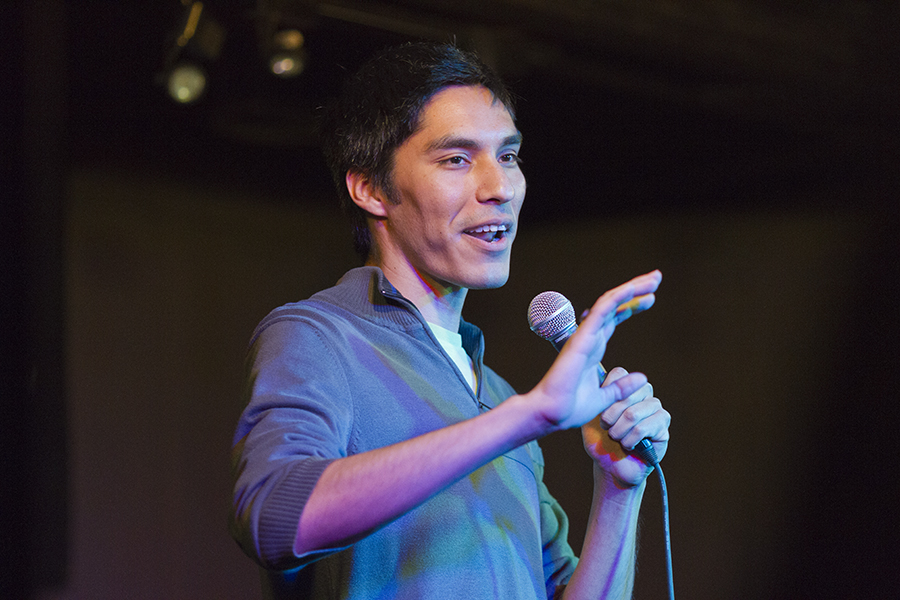
In light of last spring’s underwhelming comedy performance, UCR’s eighth adventure into the realm of comedy had to prove that it was more than just a footnote to end each quarter’s Barn series. Fortunately for the campus, Comedy Apocalypse VIII avoided last quarter’s failings. The show was not perfect and started off slow, but by the end it proved to be a definite improvement over its predecessor and gave school-weary students a reason to be excited for next fall.
It was a chilly evening when crowds of UCR students stood in line to gain access to the Barn. The Barn itself was nearly full, with harried cooks rushing to fulfill the numerous orders demanded by hungry event-goers. Excited students chatted with their neighbors, giving rise to an audible hum of voices until the lights dimmed, leaving only the front stage illuminated in multi-colored light.
Omar Nava once again served as the emcee for the night. Referencing the “friend zone,” Nava shared his attempts to kindle a relationship with a woman uninterested in romance, earning laughs with the claim that she used him like an “emotional dildo.” He then went on to describe his boring sex life and his attempts to invigorate it through film. The humorous result was a sex tape that turned out more like a documentary with a British narrator.
But Nava’s act consisted of more misses than hits. Opening with a joke about his desire to marry Hispanic women with children, the audience laughed uncomfortably through the overly long build-up, culminating in Nava’s realization that it was racist of him to assume they were single. Nava went on to joke about poverty and landed laughs only when he lampshaded the audience’s lackluster applause. “They can’t afford to be excited,” he remarked to the crowd. The act was encapsulated in a few awkward moments when Nava was forced to give up on a joke that relied on the audience’s knowledge of notebook manufacturer Lisa Frank.
Alice Wetterlund continued the subpar performance with a slate of jokes that jumped randomly from one topic to another. Her self-deprecating humor had potential, but it was quashed by her choice of difficult topics ranging from breast cancer to suicide. As the audience grew silent, Wetterlund strayed into political territory, describing conservatives as backward in the set-up to a joke that never came.
Wetterlund’s true skills went unused for most of her act. Retelling her time working in the fashion industry, she put on a convincing Scottish accent to illustrate her misadventures with a Scottish customer to a laughing audience. But this potential was not realized, and as time passed painfully by, Wetterlund seemed to grow more flustered, forcing her to resort to ad-libs like, “I’m actually super high right now.”
The comics picked up the pace once Nate Bargatze took the stage, addressing his experience taking remedial courses at a Tennessee community college. “I took math as a class. Like, I bought a book and the title said, ‘Math,’” he deadpanned. The jokes centered on stupidity and the absurdities of ordinary existence, playing up Pluto’s demotion from planetary status to support his disbelief in science. A particularly memorable moment occurred when he related his travels to Honduras and expressed his incredulity at the advice given for treating a snake bite: capturing the snake.
Bargatze then tackled the experience of growing up by discussing his childhood with a clown as a father, successfully tapping into students’ awkward experiences growing up. “Have you ever been yelled at by a clown,” he asked an audience doubled-over in laughter. “Do you have any idea how confusing that is, to be yelled at by someone who has a smile painted on his face?”
The final comic to take the stage continued the good mood generated by Bargatze with his own whimsical, absurdist humor. Rory Scovel gave half his act in a faux German accent that could easily be perceived as real. But although Scovel made jokes about Germany, he did not limit himself — wolverines and the poor placement of audio speakers on-stage were all brought up in his whirlwind style.
Scovel interacted the most with his audience, scouring the room for an unsuspecting student to play the piano and seamlessly integrating him into his act. The result was the sound of Coldplay floating around the Barn as Scovel went on a five-minute long riff about the trials and tribulations inherent in grocery shopping. The skit dragged on a bit long at times, but Scovel’s dynamic style recaptured the audience’s interest.
Each of the comedians took to the stage with their own unique stylings, but made only token efforts to reach out to their college student audience by addressing topics like roommates. The comedy was priceless and made the walls of the Barn reverberate with the audience’s peals of laughter. But for the most part, the comedy could be obtained anywhere. There’s plenty of fun to be had about the college experience, especially with finals coming up — but these topics were left untouched.
The eighth iteration of Comedy Apocalypse proved to be a great comedic performance and escaped the fate of its predecessor by providing a stressed-out college crowd with a fun experience. The early lineup pushed the event to the edge of a precipice, but Bargatze and Scovel pulled the night back before it could plummet irretrievably into a sea of boredom.
When the sun arose the next day, every attendee was faced with the same schedule of school and homework. But for one night of near-constant laughs, students were able to forget their stress and enjoy a well-earned night off.








